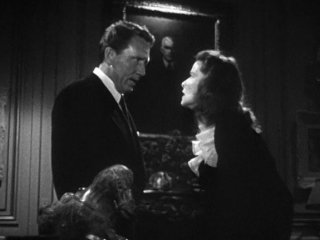1942 was a time of high ideals in the midst of war. This is a film about truth versus ideals which may be why it’s somewhat forgotten now. Keeper of the Flame stars Spencer Tracey as Steven O’Malley, a war correspondent back in the United States in time for the public funeral of beloved civic leader whom he wants to write biography of. However, the man’s grieving widow, Christine Forrest (Katherine Hepburn), is so determined to keep her husband’s memory pristine that she objects to reporters writing anything beyond his heroism and tragic death in a car accident.
In his pleas to convince Christine Forrest, Steven meets several people wrapped up in the end of a public figure. Even before encountering Christine, he is verbally accosted by her cousin Geoffrey (hey! it’s the Sargent from FTroop!) who has taken the death particularly hard. The house has a gatekeeper who was once Mr. Forrest’s superior officer and claimed to have been rescued by his now deceased boss. His son is Jeb, a distraught little boy who blames himself for Mr. Forrest’s death and missus his older sister who used to work for Mr. Forrest.. There is an elderly Mrs. Forrest, Christine’s mother-in-law who rambles in code. Dr. Fielding provides a more human version of Mr. Forrest, critical of the hero-worship the man inspired in others and blames him for institutionalizing Jeb’s sister. And lastly, there is Clive Kerndon, the family’s private secretary who is on Steven’s side (and I’m pretty sure had a crush on Mr. Forrest despite everything).
Despite the politically inspired youth groups, the pride of everyone in town, and the liberal and lofty idea Forrest left behind, Steven has difficulty writing the biography. He discovers that so much of the “great man’s” life is shadowed. He never expected perfection, yet he starts to suspect more sinister secrets about everyone involved. Christine and Kerndon are guarded about Mr. Forrest’s past and personality except the same rehearsed lines of his greatness and devotion to causes. I won’t give away the ending.
As far as writers go, I like the imagery in this movie of reporters all rushing with their little suitcase typewriters, fighting for a place at a hotel table and typing like mad to reach a deadline. My favorite is Jane, a secondary character who is slightly more fleshed out than the typical “lady reporter”. Tracey’s character represents what trying to print truth can do to a person over time. He’s a man with conviction and empathy who saw World War II first hand and comes home with a broader view of heroes and villains. He wanted to write the biography for other people so they could have more home in something good, hope he knew he was losing throughout the war. I like the idea of a writer wanting to give something to others even if he no longer had it himself. Christine states that she wondered if Steven “spoke as he wrote” and responded, “I speak as I feel and I feel very deeply about this”. Despite everything, he still thought truth was most important.



